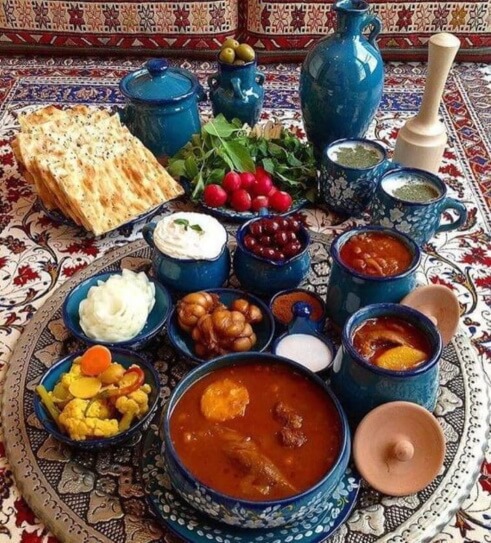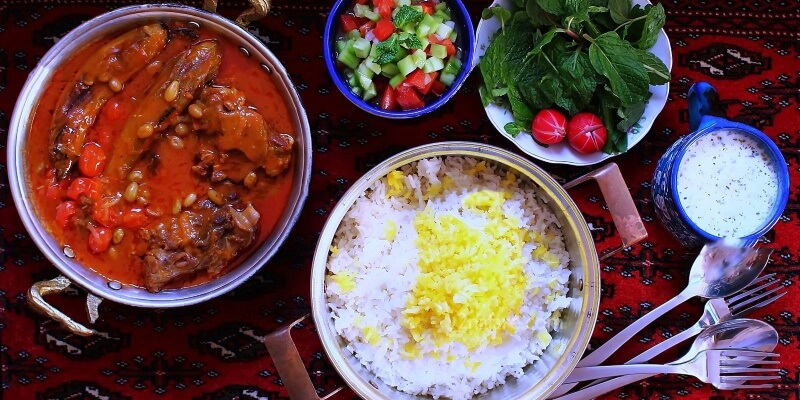The rules that hosts and guests follow in Iran
For those travelers who want to learn as much as possible about the culture of their destination and immerse themselves in it, spending time with a local family is a great experience. As a traveler in Iran, you may be invited to an Iranian’s house or choose to try our Iranian Hospitality tour and experience the world-famous Iranian hospitality. This unique and interesting experience can give you an insight into an Iranian family’s home and Iranian gatherings. Iranian Culture, like most others, includes a few costumes and rules when it comes to being a host or a guest. If followed, these rules will help you have a more convenient and realistic experience as a guest in an Iranian home. However, travelers are not expected to behave like a local. This article presents some of the general guidelines and rules of being a host or a guest in Iran.

Rules applying to the host
-
Paying attention to preferences and diets
One of the best qualities a host can have is caring about their guests’ tastes and dietary restrictions. The host can ask their guests about their favorite dishes, especially close friends and family, beforehand, try to prepare them, and apologize if it’s not possible to do so. This way the host can make the gathering much more convenient for the guests by avoiding serving them dishes they may not be able to enjoy.
-
Serving meals on time
It’s recommended to serve the food shortly after the guests arrive so that they will be able to rest and enjoy the rest of the party better. Especially in case the guests are coming from a long way or other cities and therefore are exhausted and hungry.
-
Not asking the guests about being hungry
Among Iranians, it’s common to offer guests some food without asking them whether they are hungry or not. Since some guests are shy, they might refuse to eat and say that they are not hungry even if they are.
-
Having dinner/ lunch with the guests
In Iranian culture, it is considered impolite to let guests eat alone. The host should have lunch/dinner with their guests and mustn’t leave the table until everyone is finished since some guests may feel uncomfortable eating alone. It’s also important to bring enough food to the table and it is disrespectful to bring too much or too little.
-
Respecting the guests
Iranian hosts always believe in respecting their guests above all. For this reason, it is considered impolite for a host to criticize their guests in front of others even if someone else does. Moreover, it’s rude to stare at guests during meals or comment on their manner of eating.
-
Always being prepared to receive guests
Those who have many friends or a large family or that are famous for being kind and generous hosts are likely to receive guests at short notice. Thus, they should always be prepared to welcome their guests and serve them some food. This way the host won’t have difficulties preparing food and can receive their guests properly.
Some of the other rules that a host should follow are:
- Trying to discuss subjects about which the guests feel comfortable talking
- Not complaining too much about their personal problems
- Not interrupting the guests when they are speaking
- Not showing that they are bored or angry if they don’t like the subject being discussed
- Not insulting family members in front of the guests

Rules applying to guests
-
Notifying the host in advance
Iranians highly value their guests and always try to receive them kindly and serve them the best dishes and drinks possible. Therefore, one should notify the host a few days prior to going to their house and avoid unscheduled visits. This way the host will have enough time to prepare for the party, won’t have difficulties preparing food and the other necessities and won’t be embarrassed due to failing to organize a proper gathering.
-
Being on time
In Iran, punctuality is very important when it comes to visiting someone’s house. It’s courteous to arrive at a party or gathering on time as delay may keep the host waiting and arriving early may cause embarrassment if the host is not prepared to receive guests.
-
Sitting where they are offered
When guests enter the host’s house, they are usually taken to the living room or any other room that the host has prepared for receiving the guests. It’s polite that the guests sit in the seats that they are offered as sitting elsewhere may not be convenient for the residents of the house.
-
Respecting the hosts’ privacy
Even though some hosts might offer their guests to visit the other rooms of the house, guests shouldn’t enter any room without the host’s permission, open any closet or drawer or touch the host’s personal belongings. Doing so will be disrespectful to the host and a violation of their privacy.
-
Not making unreasonable requests
Iranians are always committed to being a good host. They prepare the best food, drinks, fruits, etc. that they can for their guests. However, guests must understand their host’s situation and don’t complain about the food they’re being served or ask for something else.
-
Not being picky about food and prioritizing it
Unfortunately, some people believe that parties and gatherings are only about eating. They only judge the host based on the food being served and only ask the others about the food after a party. Although most Iranian gatherings include lunch or dinner and fruits, drinks and snacks are served, it’s immoral to only see gatherings as a feast rather than an opportunity for social interaction.


